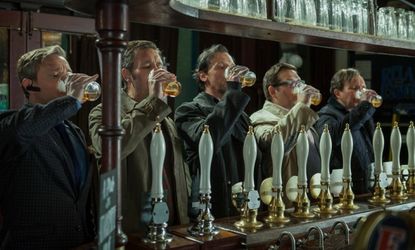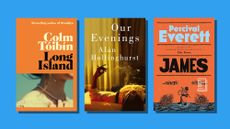INTERVIEW: The World's End director Edgar Wright and star Nick Frost
The team behind Shaun of the Dead and Hot Fuzz have finally delivered the last installment of the Cornetto Trilogy

With Shaun of the Dead and Hot Fuzz, stars Simon Pegg and Nick Frost, along with director Edgar Wright, created two of the most beloved cult comedies in recent memory. Terrifically self-aware, stylish, and distinctly British genre send-ups, the films are the first two parts of what's been unofficially dubbed the Cornetto Trilogy. The films don't share any plot continuities, but are instead tied together through several themes and running gags, including a fondness for — you guessed it — Cornetto ice cream.
With The World's End — the final film of the Cornetto Trilogy, which hits U.S. theaters today — the trio is back with a boozy sci-fi comedy about a group of estranged high school friends who reunite to recreate a legendary pub crawl from their youth. But the festivities are interrupted when they discover that the people of their hometown are actually aliens. Like Shaun of the Dead and Hot Fuzz, The World's End exhibits a deep appreciation for its cinematic influences while masterfully spoofing genre conventions.
I recently sat down with star Nick Frost and director Edgar Wright to talk about the trilogy, their writing process, and the eclectic cinematic influences hidden within the thematic subtext of their films. Here's a (slightly edited) transcript of our conversation.
Subscribe to The Week
Escape your echo chamber. Get the facts behind the news, plus analysis from multiple perspectives.

Sign up for The Week's Free Newsletters
From our morning news briefing to a weekly Good News Newsletter, get the best of The Week delivered directly to your inbox.
From our morning news briefing to a weekly Good News Newsletter, get the best of The Week delivered directly to your inbox.
When you first sat down to write Shaun of the Dead, did you always plan to make a trilogy like this, or did it come about after the success of the first film?
Wright: Not at all. When we made Shaun of the Dead, it was our first feature and we were just lucky to make a film, full stop. When you're struggling to get a feature film off the ground, there's no big overarching tenure plan, or anything like that. So, after Hot Fuzz, the idea of doing a third one was kind of on our minds — and then when we had the idea for this story, it became clear that we could do something that brought those other films together, and themes that were explored in both movies we could actually wrap up. We never wanted to make sequels to those other movies. We got offers to make sequels to both Shaun of the Dead and Hot Fuzz, and they never really interested us, because we like having these endings where it seems very final, but could hint at some kind of future adventure that you'll never see. There are lots of films I wish stopped at installment number one. I like Back to the Future Part II and Part III enough, but I still like the ending of the first one better. If the 1978 Halloween ended right there, that would be an absolutely classic ending. It already is, but it would be even more of a classic.
We liked this idea of making three standalone films and making them — if not like a trilogy — then like a triptych; they're like three different kind of paintings that go together. [pause] That's quite a pretentious analogy, I'm sorry. Really, the whole thing about the ice cream thing was kind of a joke. Once we had it in both films, a journalist said, "Oh, now that you've had Cornetto's in both of your films, are you going to do a trilogy?" And I said, "Yes, it's going to be like Krzysztof Kieslowski's Three Colors trilogy. This is the three flavors Cornetto Trilogy." That and the fence-jumping are like the silliest running gags between the films, but themes that run through each of them. They're all films about growing up, they're all films about the joys and perils of perpetual adolescents, and they're all films about an individual vs. a collective.
Frost: And the evolution of male friendships as well.
Sign up for Today's Best Articles in your inbox
A free daily email with the biggest news stories of the day – and the best features from TheWeek.com
How did you decide to build a sci-fi narrative around a pub crawl?
Wright: Well, there were two different ideas that kind of came together. One was that I had gone on a pub crawl when I was 19, just before I left for London, and it had been much like the one at the start of the movie — a kind of spectacular disaster, but very memorable. I had written a script about it when I was 21, but I never did anything with it. When we started promoting Hot Fuzz, I started to think, "Maybe there's something more interesting in the idea of adults trying to recreate something from their teenage years." Because it's a very fascinating thing. that there are characters like [The World's End protagonist] Gary King, who just want to be 18 again. He'll never admit that he peaked in high school, but he's trying to maintain that high from 20 years ago.
And on top of that, me and Simon [Pegg] are both from small towns, and both lived in London and would go back around Christmas to see family, and doing Hot Fuzz I had gone back to my hometown — that's where we shot it. So, there's definitely that kind of feeling when you're away from your hometown and you go back, you can't help but be bittersweet about it. The town is changing without you architecturally — chain restaurants are coming in. In Hot Fuzz, there's that shot where Nicholas Angel is riding up the street on a horse. Sanford, in that movie, is supposed to be very idyllic and pastoral, but in reality I had to digitally erase a Starbucks and a McDonald's from High Street, because they didn't seem like they belonged in Sanford.
Frost: That's because the [Neighborhood Watch Alliance] would never allow it.
Wright: Oh, absolutely! They weren't there when I was growing up, so I kind of feel like Charlton Heston in Planet of the Apes when I come back. It's like, "Oh my God, it's here, too!"
There's a theme in the movie where Gary kind of starts to have the realization about what's going on — that there are otherworldly forces — and he's happy he's telling the others what's going on, and he's smiling. He's smiling because it's easier for him to accept that there might be an alien invasion than it is for him to accept that he's old, or that the town is pretty mediocre and not really worth eulogizing. It was exactly the same for me when I'd go back home. The scene with the bully — the bully that doesn't recognize Peter — that happened to me. I remember saying to a friend of mine, "Every time I go home, it feels like Invasion of the Body Snatchers. It feels like there's somebody changing the town every time I go away."
Edgar, I know that you and Simon write the scripts for these films, but Nick, I'm curious what your involvement in that process is?
Frost: I'm usually the first person to get the script after they finish the first draft, and being an executive producer, I'll do a notes pass on the whole thing. Which, I must say, there's never a lot there — the scripts are always in great shape — so it's just more of what I think about it: What I think of the characters, or maybe this joke would work better here. And then they get it back and we spend three or four days going through the whole thing, line by line. And that's it. From there, a new draft is generated.
The thing is you can't take things personally. These are my opinions, and if they don't work, that's fine. We move on. That's the good thing about being mates — you don't feel injured or wounded, it's just part of the process, and we're all trying to push for the best thing possible.
With this trilogy, you've done a zombie movie, a buddy cop movie, and now an alien invasion movie. Were there any other genres you considered instead?
Wright: I don't know, really. What's nice about these [films] and why we haven't done sequels is because we like telling different stories. People like to say they're sort of spoofs of those genres, but we like to think of them as entries into those genres. They are a cop movie, a zombie movie, and a sci-fi movie. But then on top of that — much like the movies we loved growing up, which is sort of all the great sci-fi and horror movies that are rich in metaphor — we sort of realized that you're using those genres to sort of smuggle in something else. I like to think of them as Trojan Horses — you're making a sci-fi movie, but what you're smuggling in is actually a movie about mid-life crisis.
Frost: It's secretly a Ken Loach film.
Wright: Yes! Like a Mike Leigh film under the guise of an alien invasion film. What more do you want?! More people should see Mike Leigh's films, so this is our roundabout way of doing it. We even brought Eddie Marsan, who's kind of a Mike Leigh ringer.
Your films have a very distinctly English sense of humor. Did you ever worry that they wouldn't translate for international audiences?
Wright: Well, I think when we made Shaun of the Dead, we were very pleasantly surprised with how embraced it was — especially in North America. There wasn't anything people didn't seem to get. So once that happened, it emboldened us to keep it very British for Hot Fuzz and [The World's End] — because that's what distinguishes those movies. The truth is, if we had twice the budget, the studio would probably make us put an American actor in it, or strip away some of the idiosyncrasies. And I don't think the fans of our previous movies would want that. I think people like the movies because they give you a window into our culture, in the same way that when we watch an American movie, we learn about that culture. We've sat through plenty of jokes about baseball and stuff that we don't fully understand.
Frost: I think it's about respecting your audience and imagining that they have a brain and are smart enough to watch and enjoy something that isn't American. Once you start diluting the thing people liked in the first place to try to appeal to more people, then you have a problem.
What are your all-time favorite sci-fi movies?
Wright: I'll pick a British one and an American one. A great British one that I think is a really great movie and really timeless is Village of the Damned, which is based on John Wyndham's The Midwich Cuckoos. And an American one — even though the Don Siegler original is great — I really love Philip Kaufman's remake of Invasion of the Body Snatchers. I think that's fantastic, it's one of my favorite movies.
Frost: Because it's so creepy. By the time you realize what's happening, it's already happened. They don't land and start firing shit off. They're all around you.
Wright: I particularly love those paranoid films because it's not like War of the Worlds, where they're going to blast the shit out of everything and terraform the planet, it's like it's already happened and you're already in the invasion. I call them quiet invasion movies. John Wyndham, who wrote The Day of the Triffids and The Midwich Cuckoos, used to get criticized by Brian August — another sci-fi writer — for writing what he called "cozy catastrophes." Like a very middle-class apocalypse. I would here that phrase "cozy catastrophes" and think "Oh yeah, that sounds pretty cool!" I would say Shaun of the Dead and The World's End are cozy catastrophes.
Matt is an arts journalist and freelance writer based in Washington, D.C. He has written about film, music, and pop culture for publications including Washington City Paper, The American Interest, Slant Magazine, DCist, and others. He is a member of the Washington D.C. Film Critics Association.
-
 Today's political cartoons - December 21, 2024
Today's political cartoons - December 21, 2024Cartoons Saturday's cartoons - losing it, pedal to the metal, and more
By The Week US Published
-
 Three fun, festive activities to make the magic happen this Christmas Day
Three fun, festive activities to make the magic happen this Christmas DayInspire your children to help set the table, stage a pantomime and write thank-you letters this Christmas!
By The Week Junior Published
-
 The best books of 2024 to give this Christmas
The best books of 2024 to give this ChristmasThe Week Recommends From Percival Everett to Rachel Clarke these are the critics' favourite books from 2024
By The Week UK Published